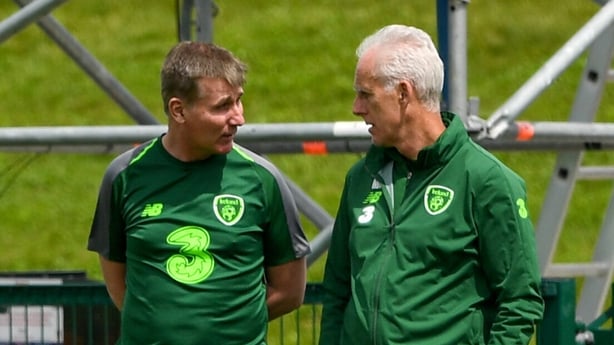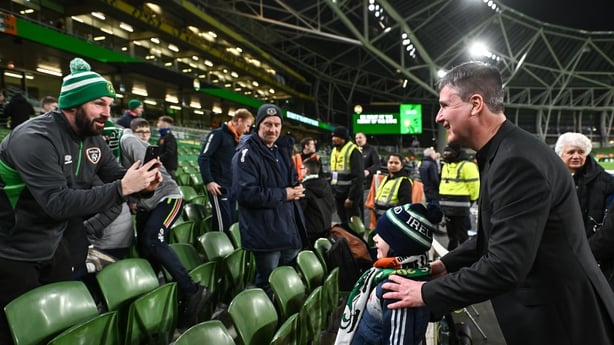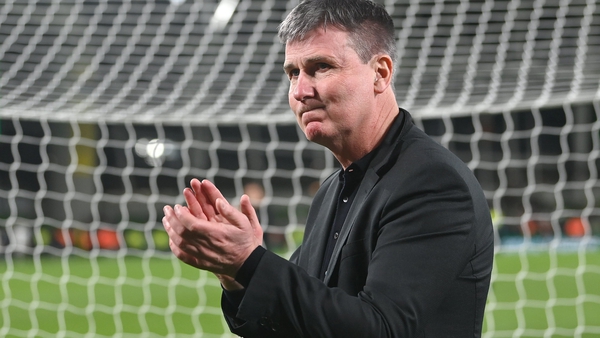Stephen Kenny came into the Ireland job under a Covid cloud, and while the new manager predicted a sunny outlook, bringing bright ideas to the role, he was ultimately unable to shift that dark shadow over his three years in the top job in the country.
In a bizarre move by the FAI, he was named Under-21 manager and senior manager-in-waiting back in 2018, when Mick McCarthy was appointed successor to Martin O'Neill. The intention was he would take over following Euro 2020.
It was a break from the conventional, big-name manager, following the high-profile appointments of Martin O'Neill and Roy Keane, as well as famed Italian duo Giovanni Trapattoni and Marco Tardelli.
Kenny fell into the Brian Kerr category of manager who had made their name in Ireland and were deemed to have earned their shot at managing the senior team.
We need your consent to load this comcast-player contentWe use comcast-player to manage extra content that can set cookies on your device and collect data about your activity. Please review their details and accept them to load the content.Manage Preferences
Kerr was a proven winner with St Patrick’s Athletic, following it up by bringing unprecedented success with the underage teams, while Kenny stood out from the pack by bringing glory to Dundalk over a six-year period, winning four league titles, three FAI Cups and qualifying for the Europa League group stages.
It is fair to say that Kenny did not enjoy unilateral support when he took over the role, with some questioning his stature within the game, while others beat him with that old stick of never having played the game at a high level.
However, considering the slowly emerging financial state of the FAI, his appointment was seen as a prudent option without having to rely on big-business donors to bankroll the position.
And within the Irish footballing family, there was a huge amount of goodwill towards Kenny, while the League of Ireland faithful were, for the large part, fully behind the manager.
Kenny also gained great traction from his assertions that he was going to have the Irish players playing a style of football that was both easy on the eye and a far cry from the 'put 'em under pressure' reputation that had been in place since Big Jack's days of the late 80s and 90s.
Kerr and McCarthy - in his first tenure - had certainly tried to gradually evolve from the bypassing of the midfield methods of the Charlton era, while the previous decade saw Trapattoni bring back the defence-minded approach, which made Irish football very hard to watch.
O’Neill’s era, that had just come to a conclusion, was often viewed in the same light as the Italian’s approach, although, the manager did eventually embrace the talents of Wes Hoolahan, while also fond of players who brought a bit of spark to the play, like Aiden McGeady.

But Kenny was spinning a much more modern approach, talking about playing out from the back, passing through the lines and dominating possession.
And he soon showed that it could be done, albeit with the Under-21s, who were flying in their qualifying group, matching the Italians, while recording an impressive away win in Sweden.
So by the time that Kenny eventually took the reins of the senior team - sooner than expected due to the impact of the global pandemic and the FAI's seismic change at the top - there was an appetite to run with his methods and hope that the players could show the quality to implement his ideas.
Kenny inherited an ageing squad, and set about injecting a double-dose of youth into the mix.
As it turned out, there was an element of needs must, as the pandemic wreaked havoc on his squad selection, forcing him to continually pluck players from the U21s and throw them into the senior side.
Despite the constant Covid conundrums, Kenny was quite fortunate to be handed a Euro 2020 play-off for the delayed tournament, which gave him a great opportunity to take Ireland to a major tournament.
Perhaps that knock-out clash with Slovakia came just a touch too soon for the new manager, as Ireland travelled to Bratislava with just two games’ played under the new regime.
Pre-match madness then took out two players set to start as Adam Idah and Aaron Connolly were ruled out as a result of Covid close contact regulations, which forced the manager into a last-minute rethink.
Ireland actually performed well on the night and could have secured the win before the game was brought to the dreaded penalty shoot-out, which ultimately proved unsuccessful (below).
We need your consent to load this rte-player contentWe use rte-player to manage extra content that can set cookies on your device and collect data about your activity. Please review their details and accept them to load the content.Manage Preferences
Kenny’s first ten games in charge are well documented and nothing appeared to be going right for the new-look team as they lost seven and drew three, while only scoring three goals, not to mention the Videogate affair that came out of the defeat to England at Wembley after offence was caused regarding the content of Kenny's motivational video.
The new regime only really started to settle down the following summer during a team-building break, which allowed Kenny to secure his first win, beating the mighty Andorra in a friendly, before an encouraging display in Budapest, holding Hungary scoreless.
But the World Cup 2022 qualifying campaign had already begun and to say that it didn’t get off to a great start would be a massive understatement.
Drawn in a group with Serbia and Portugal and with only one guaranteed place on offer, Ireland needed a good start but despite a decent performance, they lost a five-goal thriller in Belgrade.
Disaster would strike three days later as Ireland were expected to pick up their first three points of the campaign with a standard home tie against the lower-ranked Luxembourg.
If a crowd had been allowed in the stadium that night, they would have been stunned into silence as Kenny’s side were turned over, as Luxembourg snatched a 1-0 victory, and it was eerily apt that there you could hear a pin drop as that final whistle blew.
Republic of Ireland 0-1 Luxembourg - GOAL - Gerson Rodrigues
— RTÉ Soccer (@RTEsoccer) March 27, 2021
Updates: https://t.co/1S1Bv1dqUc
Live now @RTE2 and @RTEplayer #RTESoccer #IRLLUX pic.twitter.com/ufPAvbSJyL
If Videogate was a speedbump in the road, the Luxembourg defeat put huge pressure on the manager and it was perhaps a wound that never fully healed for the remainder of Kenny’s time in charge.
The defeat did, however, see the manager come out fighting for his job, and he nearly pulled off one of the most remarkably results in Irish history as his side led 1-0 in Portugal with just two minutes of the 90 remaining on the clock.
Cristiano Ronaldo burst that particular bubble as the iconic forward’s late, late brace ensured that Ireland did not even secure a point but left empty handed making it three defeats from three in an eight-game group.
As it transpired, public opinion really started to gather momentum behind the manager, who followed it up with excellent home performances against Serbia and Portugal, leading to two well-earned draws.
Ireland had actually shown that they could play the Kenny way and match big European teams playing possession-based football – both sides would go on to qualify for the World Cup; Serbia as group winners and Ronaldo’s boys through the play-offs.
Kenny had earned a new contract that would hopefully take him all the way to Euro 2024, however, as that qualifying campaign came to a close last week, the group was long settled as Ireland were playing out a meaningless match against New Zealand.
Another two failed campaigns during the course of the new contract in the Nations League and the Euros meant that there was little chance that the manager would be maintained in his position with the senior side. His overall record reads: 40 games - won 11, drawn 12 and lost 17.
Unfortunately for Kenny, his legacy on the pitch will not point to those brave performances, but rather the demoralising defeats to Luxembourg, Armenia and Greece twice.
However, depending on what approach the FAI take into the future, the manager should certainly be remembered as the one brave enough to sacrifice his own security in the role for the greater good, as he helped implement a very high level of professionalism throughout, while employing possession-based football at every level of the international game.
As for the future for Kenny, he has probably outgrown League of Ireland management, while it remains to be seen what reputational damage has occurred from a stark losing record.

Brian Kerr would go on to manage at international level once again, following his Ireland exit, taking the job with the Faroe Islands, while Kenny may opt for a return to the club game where he has more control of squad selection.
One aspect of Kenny’s reign that should prove significant in future suitability for employment is the relationship that he has built with his squad, and the trust and respect that he has gained throughout his time in the job.
Remarkably, there has not been one dissenting voice from within the camp, while Kenny’s coaching methods, his attention to detail and tactics have all been lauded among the players, including the most senior and experienced.
Many owe the manager a debt of gratitude as their run in the Ireland team and the experience they have gained at such a young age is already reaping rewards with most players on an upward trajectory at club level.
Whether they cross paths with the departing manager in the future remains to be seen, and as for Kenny, the manager has taken his fair share of hits over the duration, however, he can emerge stronger in the right environment in this cut-throat industry.

